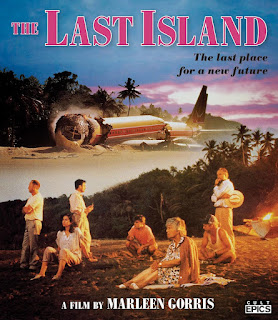The Last Island
Marleen Gorris’ first two films were brilliant precursors to a feminist uprising. A Question of Silence (1982) and Broken Mirrors (1984) featured women characters who had simply had enough of being dismissed, belittled and abused. And they remain just as powerful and relevant (unfortunately) as the decade in which they were released. Her third feature, 1990’s The Last Island, seems to offer a less confrontational solution to the battle of the sexes: just wait them out.
After their plane crashes on a deserted island, the survivors – five men, two women and a dog – begin to suspect that a worldwide catastrophe has made them the only remnants of the human race. Cooperation and camaraderie soon turn to suspicion and distrust as dwindling supplies and sexual tension threaten their island paradise. As the only woman of childbearing age, Joanna (Shelagh McLeod) is pushed into the unwilling role of Eve…while each Adam competes against each other.
The Last Island pulls Gorris’ out of her usual urban and suburban setting, but the conflicts remain the same. Staged within an exotic microcosm of sand and palm trees, our characters quickly revert to a male dominated society, complete with traditional gender roles backed up by theological threats. The fact that two of the male survivors are gay hardly even adds a speedbump to the process. The XY chromosome, Gorris seems to say, is doomed to failure and self-destruction. Even a dog can do better.
With Dick Maas (Amsterdamned) as producer, Gorris’ work is visually polished up almost beyond recognition, complete with an elaborate wrecked plane and showy camerawork. It’s fun to watch her stretch creative muscles, but the compromise involves dumbing things down a bit for a bigger audience. Her message is more blunt and yet less powerful. Where her previous films were made up of fine details, The Last Island is full of broad strokes and big ideas. But, as is the case with every Gorris film, it least it gets the conversation started.
Cult Epics completes this unofficial trilogy with a new 2K transfer and restoration from a 35mm print. There are a few bits of damage here and there but overall it looks tremendous. Dick Maas contributes a short introduction, film scholar Peter Verstraten adds an audio commentary, and columnist Annemarie Grewel sits down for a televised interview. There’s also a behind-the-scenes montage (set to music rather than narration), trailers and artwork by way of additional extras. If you enjoyed Cult Epics’ previous releases of Gorris’ film (which I highly recommend) this one will fit in the collection quite nicely.




Comments
Post a Comment